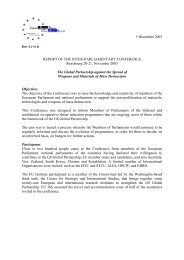The Obama Moment. European and American Perspectives
The Obama Moment. European and American Perspectives
The Obama Moment. European and American Perspectives
You also want an ePaper? Increase the reach of your titles
YUMPU automatically turns print PDFs into web optimized ePapers that Google loves.
46<br />
2. <strong>The</strong> <strong>Obama</strong> administration <strong>and</strong> Europe<br />
aid to Pakistan, <strong>and</strong> EU trade with Pakistan is relatively marginal <strong>and</strong> strained by<br />
bilateral disputes.<br />
<strong>The</strong> <strong>Obama</strong> administration has been quite disappointed by what it regards as a relatively<br />
feeble <strong>European</strong> response to its calls for help in Afghanistan <strong>and</strong> Pakistan.<br />
Having recognised that most <strong>European</strong> governments are unlikely to boost substantially<br />
their troop presence in Afghanistan, the administration wants <strong>European</strong>s to<br />
build on their self-proclaimed strengths in civilian crisis management to join a ‘civilian<br />
surge’ that could improve Afghanistan’s governance, rule of law, policing capabilities<br />
<strong>and</strong> sustainable economic development that does not rely on poppy production.<br />
EU support for a broader reform agenda in Pakistan that would encompass<br />
assistance to strengthen Pakistani democracy, resistance to violent extremism, <strong>and</strong><br />
greater economic engagement <strong>and</strong> support would be welcomed by Washington. EU<br />
efforts in both countries will do much to determine Europe’s credibility in Washington’s<br />
eyes as a global security actor <strong>and</strong> its ability to deploy ‘soft power’ tools of<br />
aid, trade <strong>and</strong> diplomacy to stabilise troubled nations.<br />
<strong>The</strong> situation in Afghanistan, however, is grim, <strong>and</strong> there are no easy choices. At the<br />
end of August 2009 General Stanley A. McChrystal, comm<strong>and</strong>er of NATO forces in<br />
Afghanistan, told the White House 8 that the mission risked ‘failure’ without more<br />
troops, stepped up efforts to deal with a corrupt Afghan government, <strong>and</strong> implementation<br />
of a genuine counterinsurgency strategy. While he concluded that ‘success<br />
is still achievable,’ he warned that unless the international community seizes<br />
the initiative within the next 12 months, it may be ‘impossible’ to defeat the growing<br />
insurgency, <strong>and</strong> Afghanistan could again become a base for terrorism. In response<br />
the administration initiated a wholesale reconsideration of the strategy it had announced<br />
only months before. This hesitation, together with a surge in violence in<br />
the country, has reinforced doubts in key <strong>European</strong> capitals about the nature, purpose<br />
<strong>and</strong> prospects of Western engagement. In short, the way forward seems unclear,<br />
<strong>and</strong> allied solidarity will be tested.<br />
Common security challenges<br />
Beyond Afghanistan <strong>and</strong> Pakistan, <strong>European</strong>s <strong>and</strong> <strong>American</strong>s are challenged to<br />
tackle a broader range of international security challenges that they face together.<br />
Closer transatlantic cooperation is not only essential to prevent Iran from developing<br />
nuclear weapons, it will be even more essential in crafting an extended deterrence<br />
regime in the Persian Gulf/Middle East if Iran does in fact acquire such<br />
8. Bob Woodward, ‘McChrystal: More Forces or “Mission Failure.”’ <strong>The</strong> Washington Post, 21 September 2009.



